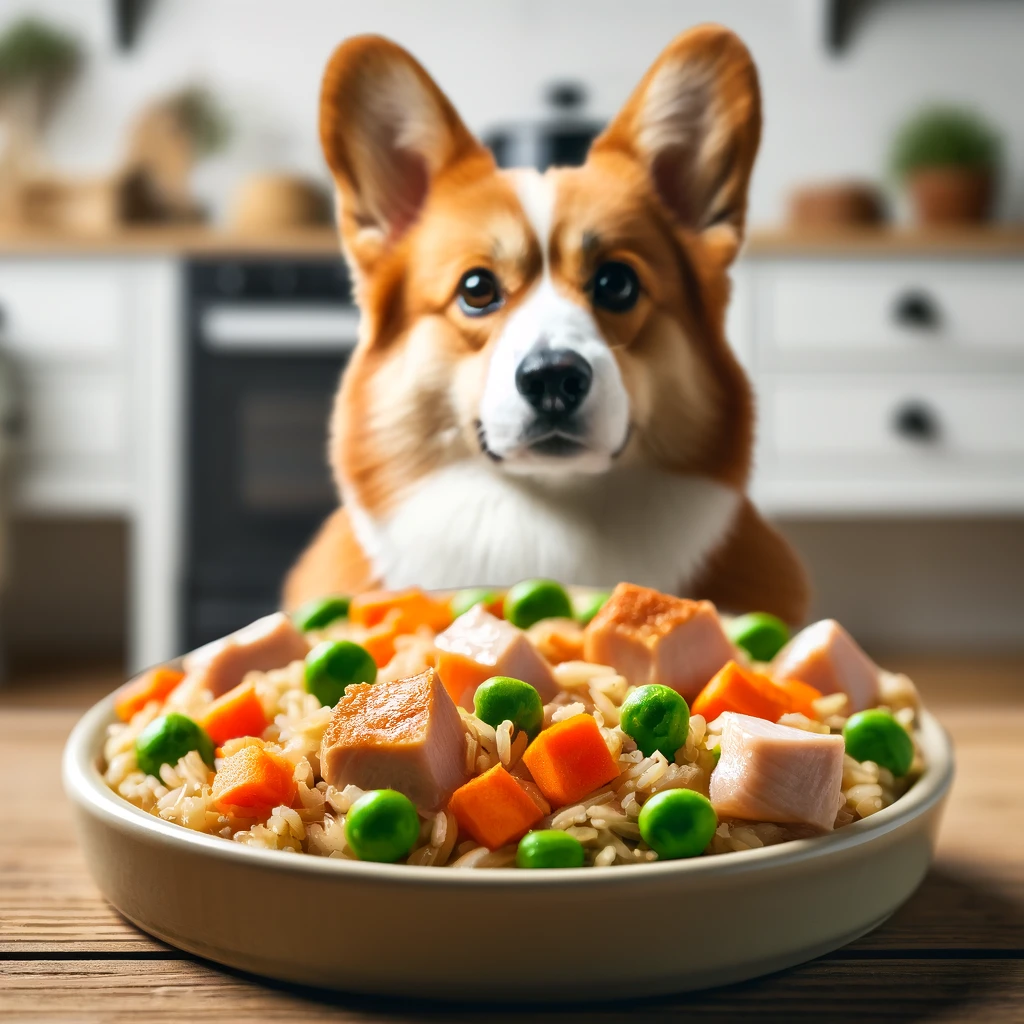
Today, we’re excited to feature a nourishing “Chicken and Rice Dinner” specifically formulated for the lovable Corgi. Renowned for their distinctive appearance and spirited personality, Corgis are not just royal favorites but also beloved family members who need a diet tailored to their unique physiological and health requirements. This homemade dog food recipe for Corgis is designed to support their active lifestyle and help manage common breed-specific issues like weight gain and joint health.
Corgis, with their sturdy little bodies and boundless energy, require a balanced diet rich in proteins to support muscle health, alongside carefully measured carbohydrates to maintain their energy levels without contributing to obesity. Our “Chicken and Rice Dinner” meets these needs perfectly, adhering to the veterinarian-recommended macronutrient ratio of 60% protein, 20% carbohydrates, and 20% fats. It’s a homemade dog food recipe that’s as nutritious as it is delicious, crafted with your Corgi’s well-being in mind.
In this recipe, we use high-quality chicken breast as the primary source of protein, ensuring your Corgi gets the lean, muscle-building nutrients it requires. The brown rice serves as an excellent source of carbohydrates, providing long-lasting energy, while peas and carrots add fiber, vitamins, and a hint of natural sweetness that Corgis love. A dash of fish oil introduces essential omega-3 fatty acids, promoting a healthy coat and supporting joint health.
Whether you’re a seasoned dog food DIYer or new to the concept of homemade meals for your pets, this blog post will guide you through creating a meal that supports the health requirements of your Corgi, enhancing their diet with food made from the heart. Stay tuned as we dive deeper into the benefits of a homemade dog food recipe for Corgis, offering you practical advice on how to prepare food that’s fit for a king—or in this case, a Corgi’s royal lineage!
Here’s a chicken-based homemade dog food recipe tailored for Corgis, considering their specific nutritional needs and common health concerns. This recipe adheres closely to the veterinarian-recommended guideline of 60% protein, 20% carbs, and 20% fat by weight. It is scaled to fit the typical daily feeding requirements for a Corgi, which generally weighs between 25-30 lbs.
Chicken and Rice Dinner for Corgis Recipe
Ingredients:
- 180g chicken breast (cooked and finely chopped)
- 30g brown rice (cooked)
- 30g peas (steamed)
- 30g carrots (steamed and mashed)
- 10g fish oil
Instructions:
- Cook the chicken breast thoroughly until no pink is visible, then finely chop.
- Cook the brown rice according to package instructions.
- Steam the peas and carrots until they are soft, then mash the carrots.
- In a large mixing bowl, combine the chicken, cooked rice, peas, and mashed carrots.
- Drizzle with fish oil and mix well to ensure all ingredients are evenly distributed.
Daily Serving:
- Approximately 1 cup per day for a 25-30 lb Corgi.
Macronutrient Composition:
- Total Weight of Recipe: 250g
- Protein: Chicken breast (180g) contributes to ~72% protein.
- Carbs: Brown rice (30g), peas (30g), and carrots (30g) contribute to ~36% carbs.
- Fats: Fish oil (10g) contributes to ~12% fats.
Alternatives:
- For allergies, if chicken is an issue, consider substituting with turkey or rabbit.
- For sensitive stomachs, replace brown rice with cooked oats, which are gentler on the stomach.
- For dogs prone to obesity (a common issue in Corgis), monitor the portion sizes and consider reducing the amount of rice and increasing non-starchy vegetables.
- For arthritis, which Corgis can be prone to, consider adding a supplement like glucosamine or additional omega-3 fatty acids from fish oil.
This recipe provides a nutritious, balanced meal specifically designed for the needs of Corgis, incorporating high-quality protein, easily digestible carbohydrates, and healthy fats. Always consult with a veterinarian before making any significant changes to your dog’s diet, especially for dogs with specific health conditions or dietary needs.
